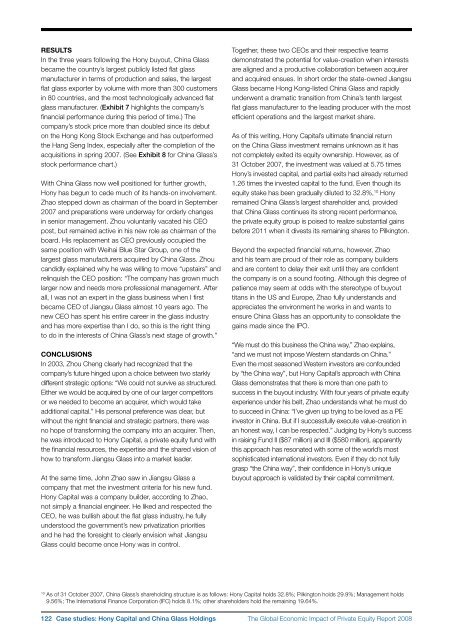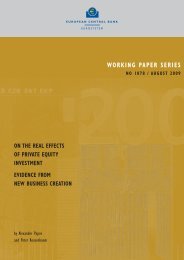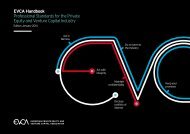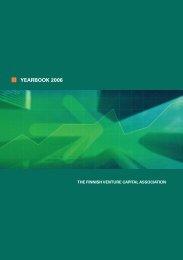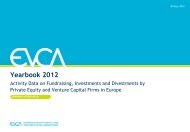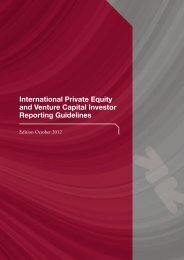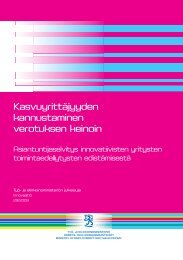The Global Economic Impact of Private Equity Report 2008 - World ...
The Global Economic Impact of Private Equity Report 2008 - World ...
The Global Economic Impact of Private Equity Report 2008 - World ...
- No tags were found...
You also want an ePaper? Increase the reach of your titles
YUMPU automatically turns print PDFs into web optimized ePapers that Google loves.
ResultsIn the three years following the Hony buyout, China Glassbecame the country’s largest publicly listed flat glassmanufacturer in terms <strong>of</strong> production and sales, the largestflat glass exporter by volume with more than 300 customersin 80 countries, and the most technologically advanced flatglass manufacturer. (Exhibit 7 highlights the company’sfinancial performance during this period <strong>of</strong> time.) <strong>The</strong>company’s stock price more than doubled since its debuton the Hong Kong Stock Exchange and has outperformedthe Hang Seng Index, especially after the completion <strong>of</strong> theacquisitions in spring 2007. (See Exhibit 8 for China Glass’sstock performance chart.)With China Glass now well positioned for further growth,Hony has begun to cede much <strong>of</strong> its hands‐on involvement.Zhao stepped down as chairman <strong>of</strong> the board in September2007 and preparations were underway for orderly changesin senior management. Zhou voluntarily vacated his CEOpost, but remained active in his new role as chairman <strong>of</strong> theboard. His replacement as CEO previously occupied thesame position with Weihai Blue Star Group, one <strong>of</strong> thelargest glass manufacturers acquired by China Glass. Zhoucandidly explained why he was willing to move “upstairs” andrelinquish the CEO position: “<strong>The</strong> company has grown muchlarger now and needs more pr<strong>of</strong>essional management. Afterall, I was not an expert in the glass business when I firstbecame CEO <strong>of</strong> Jiangsu Glass almost 10 years ago. <strong>The</strong>new CEO has spent his entire career in the glass industryand has more expertise than I do, so this is the right thingto do in the interests <strong>of</strong> China Glass’s next stage <strong>of</strong> growth.”ConclusionsIn 2003, Zhou Cheng clearly had recognized that thecompany’s future hinged upon a choice between two starklydifferent strategic options: “We could not survive as structured.Either we would be acquired by one <strong>of</strong> our larger competitorsor we needed to become an acquirer, which would takeadditional capital.” His personal preference was clear, butwithout the right financial and strategic partners, there wasno hope <strong>of</strong> transforming the company into an acquirer. <strong>The</strong>n,he was introduced to Hony Capital, a private equity fund withthe financial resources, the expertise and the shared vision <strong>of</strong>how to transform Jiangsu Glass into a market leader.At the same time, John Zhao saw in Jiangsu Glass acompany that met the investment criteria for his new fund.Hony Capital was a company builder, according to Zhao,not simply a financial engineer. He liked and respected theCEO, he was bullish about the flat glass industry, he fullyunderstood the government’s new privatization prioritiesand he had the foresight to clearly envision what JiangsuGlass could become once Hony was in control.Together, these two CEOs and their respective teamsdemonstrated the potential for value-creation when interestsare aligned and a productive collaboration between acquirerand acquired ensues. In short order the state‐owned JiangsuGlass became Hong Kong‐listed China Glass and rapidlyunderwent a dramatic transition from China’s tenth largestflat glass manufacturer to the leading producer with the mostefficient operations and the largest market share.As <strong>of</strong> this writing, Hony Capital’s ultimate financial returnon the China Glass investment remains unknown as it hasnot completely exited its equity ownership. However, as <strong>of</strong>31 October 2007, the investment was valued at 5.75 timesHony’s invested capital, and partial exits had already returned1.26 times the invested capital to the fund. Even though itsequity stake has been gradually diluted to 32.8%, 10 Honyremained China Glass’s largest shareholder and, providedthat China Glass continues its strong recent performance,the private equity group is poised to realize substantial gainsbefore 2011 when it divests its remaining shares to Pilkington.Beyond the expected financial returns, however, Zhaoand his team are proud <strong>of</strong> their role as company buildersand are content to delay their exit until they are confidentthe company is on a sound footing. Although this degree <strong>of</strong>patience may seem at odds with the stereotype <strong>of</strong> buyouttitans in the US and Europe, Zhao fully understands andappreciates the environment he works in and wants toensure China Glass has an opportunity to consolidate thegains made since the IPO.“We must do this business the China way,” Zhao explains,“and we must not impose Western standards on China.”Even the most seasoned Western investors are confoundedby “the China way”, but Hony Capital’s approach with ChinaGlass demonstrates that there is more than one path tosuccess in the buyout industry. With four years <strong>of</strong> private equityexperience under his belt, Zhao understands what he must doto succeed in China: “I’ve given up trying to be loved as a PEinvestor in China. But if I successfully execute value-creation inan honest way, I can be respected.” Judging by Hony’s successin raising Fund II ($87 million) and III ($580 million), apparentlythis approach has resonated with some <strong>of</strong> the world’s mostsophisticated international investors. Even if they do not fullygrasp “the China way”, their confidence in Hony’s uniquebuyout approach is validated by their capital commitment.10As <strong>of</strong> 31 October 2007, China Glass’s shareholding structure is as follows: Hony Capital holds 32.8%; Pilkington holds 29.9%; Management holds9.56%; <strong>The</strong> International Finance Corporation (IFC) holds 8.1%; other shareholders hold the remaining 19.64%.122 Case studies: Hony Capital and China Glass Holdings<strong>The</strong> <strong>Global</strong> <strong>Economic</strong> <strong>Impact</strong> <strong>of</strong> <strong>Private</strong> <strong>Equity</strong> <strong>Report</strong> <strong>2008</strong>


